|

STORIES MY FATHER NEVER TOLD ME
A Memorable Train Trip, or Lucy Ann Babb's "Pike's Peak" Farm
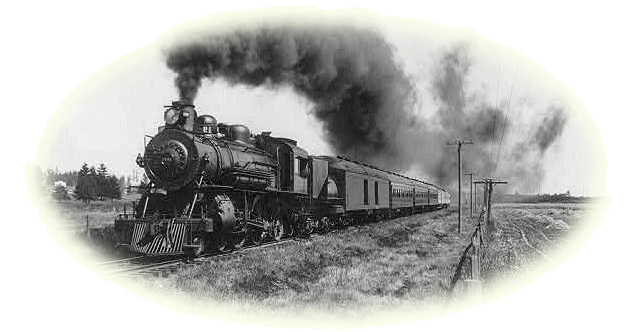
PART TWO: A MEMORABLE TRAIN TRIP
After Lucy Ann Babb received her inheritance, the equivalent of $35,000 in today's money (2015) she wrote to her family at Mexia—nephew Will Butler, daughter Virginia Alice Butler, and son Arthur Babb—asking them to visit her in Denison. She explained that she had decided to buy a farm with her windfall and wanted them to help her choose a piece of property. Although Arthur did not mention it in his memoirs (our chief source of information about this episode), it seems likely that Lucy also paid their train fare.
Of the six people who made the trip, nineteen-year-old Arthur was probably the most excited, with the possible exception of his five-year-old nephew Herman Butler—Will and Virginia Alice's oldest child. Neither Arthur nor Herman, so far as it is known, had ever ridden a train before. It is unlikely that three-year-old Lucy Ozelle Butler fully comprehended the situation and of course, four-month-old Lillian, Lucy Ann's most recently born grandchild, was far too young to have any notion of what it was all about.
Arthur Babb was a good story-teller. We will therefore defer to him to tell us what happened on this memorable train ride:
In the summer of 1885 an estate was settled to which my mother had fallen heir, and which had been in litigation for some years. She decided to buy a small farm and collect the brood that had been scattered the past few years. I was living at the time with a sister and brother-in-law on a farm near Mexia, Texas. Mother wrote, asking us to pay her a visit at Denison-where she was making her home together with another of my sisters. The idea of getting to see my mother and little brother and sister whom I had not seen for more than a year, besides getting a long ride on the train, pleased me greatly. I was then about nineteen years old but small for my years. Thinking back I fancy that I had the appearance of a boy of about fourteen. The crops had just been laid by. "Laying by" means giving the last plowing. I presume the term is still used by farmers. We had quite a bit of preparation to make. We had to find some one to milk the cows, feed the chickens, and care for the place in general until we returned.
A week getting ready seemed a long time to me, and the thrill of the anticipation was beyond description. Beside the pleasure of the trip, there was another thought hovering in my breast; we were going to have a "home" and I could be with my mother and brother and sisters again. We had the money to pay for it and get the necessary imple-ments and feed for the coming year, and I had two good horses. Lucy, that I had raised from a colt, had grown to be a big bay mare and I had a match for her. I felt sure that I had the best team in the country.
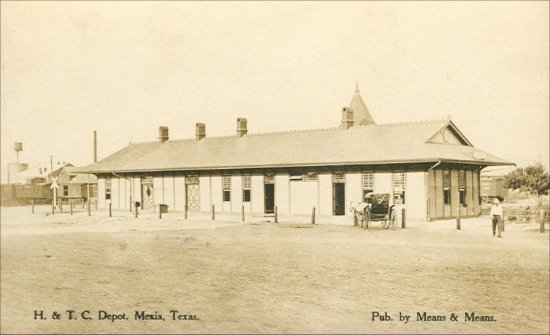
After a week's preparation we were all set and ready to go. Wallis McFall, our neighbor, took us to the depot. We got up early and reached town by 6:00 A.M. or before—but the train was late, just as I expected. We got our tickets and it finally came. I was afraid it would pull out and leave us before we could get on, but it did not. We got comfortably seated and it appeared to me that the train waited unnecessarily long before starting. I could smell the varnished coach and the news-butcher's papers and fruit. I have smelling things all my life. I knew the smell of each neighbor's house and my playmates. If a boy came up behind me I knew if it was Dave Strickle or Charley Ragsdale by his smell. Each of my horses smelled different. (Even until this day I believe I can stick my head in a car door and tell if a dog has been riding in it within the past month.) The train finally started. I watched the trees and telegraph poles as they flitted past me. The train was smoother riding than a buggy and ran faster than the best horse that I had ever ridden. I was like David Harrum; horses were always my basis of comparison for everything. We were passing through country that I was acquainted with. As I looked out, each familiar scene was associated with some occurrence of the past. I was taking stock and making comparisons of former days. Presently we were passing through the old Manning farm [where the Babb family had lived in earlier years]. I looked out at the prairie in front, where I used to stake old Dolly Varden [a horse], the old buildings now vacant and going to wreck. The peach orchard was almost all gone. How could the owners permit such a dear old place to pass into oblivion? The news-butcher was passing through the car crying out his stock, "Apples, peaches, bananas, grapes, nuts, chewing gum, candy." Did you ever see so many good things in one basket?
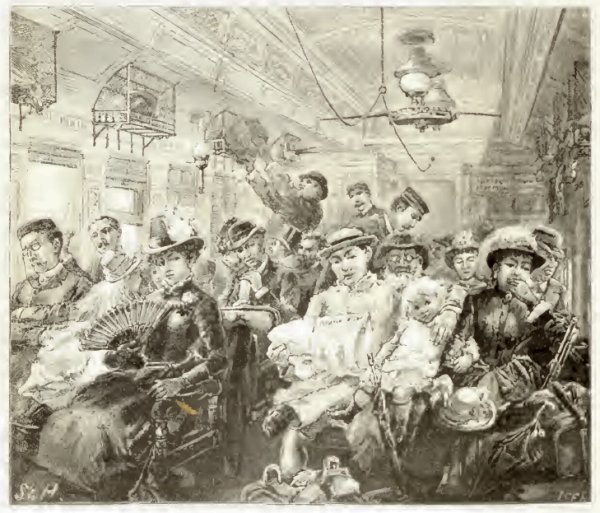
The interior of an American passenger train carriage; from Harper's Magazine, August 1885, page 378.
The news-butcher seemed to give me special attention. I was not used to being noticed much and fully appreciated his graciousness and pronounced him a gentleman. As I remember, I rewarded him pretty well. I had a little money that I had earned doing odd jobs-most of which he got much easier than I did. But I learned a lesson: "It pays to be polite."
We were soon at Corsicana, where the train stopped 15 minutes for breakfast. Sister Alice had prepared a shoe box full of fried chicken and biscuits and a paper sack of tea-cakes. I have often wondered why the shoe box is so universally used for lunches. I would no more ask you if you had ever seen a Negro woman wearing a man's hat, with a fishing pole on her shoulder. Of course you have, It's just a natural thing—but we do not know why.
When the porter announced, "Cor-si-can-na! 15-minutes for Breakfast!" I did not stop at the shoe box. I was getting to be a man of the world and must learn its ways. I promptly alighted and walked in to the lunch room. But I was a little nervous and sat near the door where I could keep an eye on the train. I had just placed my order and was glancing around when I saw the train pulling out! I grabbed my hat and made a break for the door. I was pretty fleet in those days and knew that it would take a fast train to get away from me if there was nothing in the way. It had about two car lengths the start of me. The first block I did not gain a foot. There were some passengers standing on the rear plat-form. They were cheering me to beat the band. I put on a little more steam. The next block I was gaining. Then the train began to slow up.
I thought they were going to wait for me. Just as the train came to a full stop I boarded it. Then it began backing into the depot, where the crowd stood jeering. They were only setting out a coach! I resolved then and there never to laugh at a man for chasing a train, even if he missed it. I never knew what became of my order at the lunch counter.
Dallas was the next stop, for lunch. The depot was a little box building sitting where the old Union depot (now abandoned) sits. It served both the Houston & Texas Central and Texas & Pacific railroads. A large wooden platform extended from the T. & P. track to Elm Street. I did not get off here for lunch but stayed close to the shoe box in-stead.
We arrived at Denison after dark. Mother, Sister Ella, and Charley, my brother-in-law, were at the depot to meet us. I'd had plenty of riding and was ready to get off.
Although Arthur seems to have had a remarkably good memory of the trip, owing to the fact that he did not write about it until nearly fifty years later his recollections are not entirely accurate. A Houston & Texas Central Railway timetable, effective June 14, 1885 verifies that the No. 3 train, the so-called "Chicago Express," was scheduled to leave Mexia in the early morning, but at 5:03 a.m., about an hour earlier than Arthur remembered. It then stopped briefly at Wortham (5:20 a.m.), Richland (5:45 a.m.), Angus (6 a.m.), before arriving at Corsicana at 6:35 a.m. There is no mention of a fifteen-minute breakfast stop at Corsicana (or anywhere else) in the timetable.
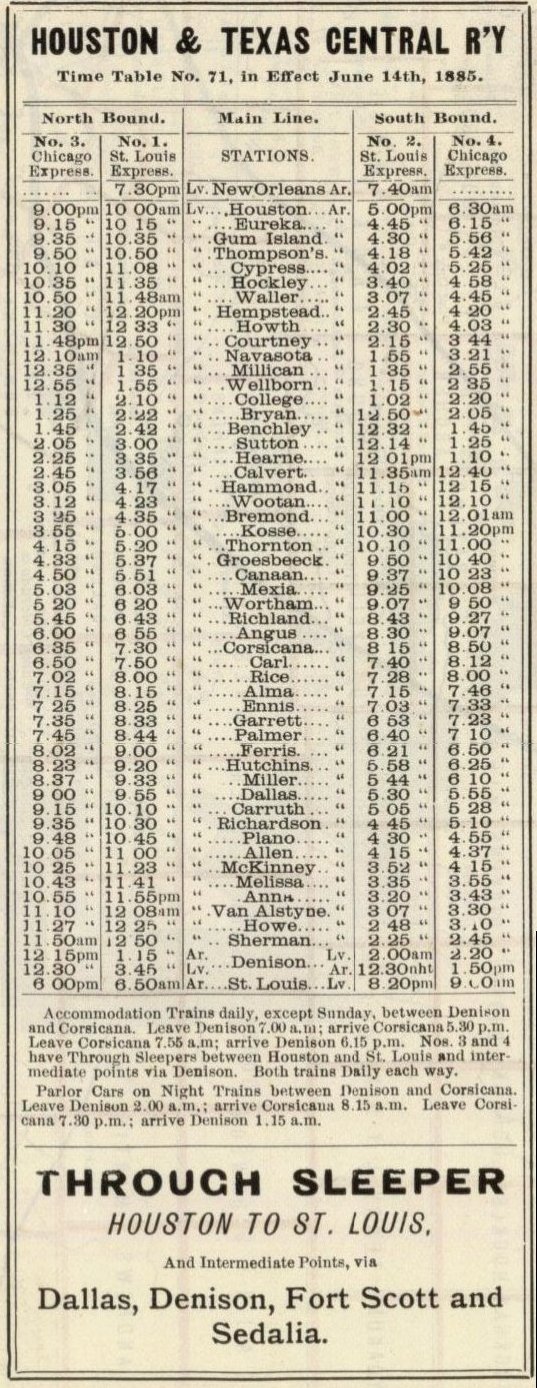
Arthur was mistaken too about the arrival time in Denison. Although the train stopped at several North Texas towns and cities, including Ennis, where Arthur would one day meet his future wife, and Dallas, the city where he would end up spending most of the later years of his life, the train eventually arrived at Denison at 12:15 p.m., where it did stop for fifteen minutes before going on to St. Louis, Missouri and Chicago. There was a Houston & Texas Central train that reached Denison after dark, the No. 1 "St. Louis Express" that arrived at 1:15 a.m., but it did not leave Mexia until 6:03 p.m.
In November 1883, less than two years earlier, the railroads of the United States agreed to establish four distinct time zones, which were entirely their creation, in order to operate more safely and efficiently. Until 1918, when Congress finally passed a bill making time zones uniform across the entire country, most if not all communities had two clocks at the train depot, one labeled "local time" and another marked "railroad time." Perhaps this accounts for the slight discrepancy in Arthur's story as to what time he and his family members arrived at the depot, and perhaps the train wasn't late after all. If Arthur had a watch (which unfortunately he doesn't mention), it would almost certainly been set for local time. As for his recollection of arriving after dark, we can only conclude that he must have either confused this trip with the return journey to Mexia (where the 2:20 p.m. train from Denison arrived at 10:08 p.m.) or another trip to Denison that he took later in life.
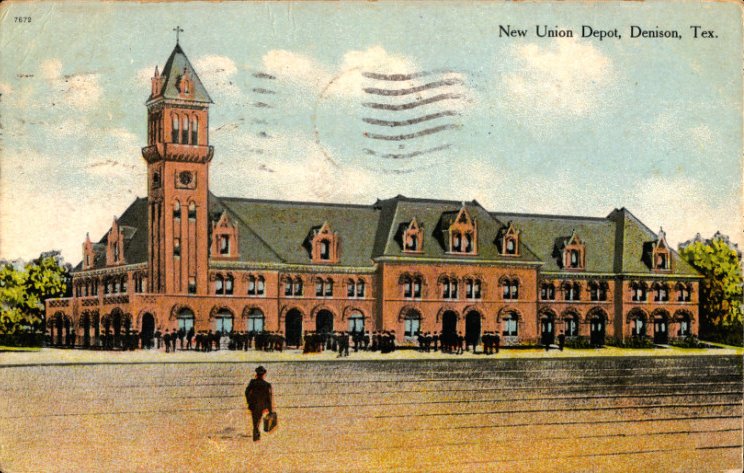
Union Depot, Denison, where the Will Butler family and Arthur Babb arrived (and departed) in 1885.
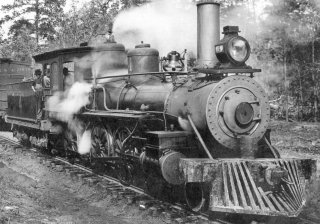 It is quite easy to calculate, even without a timetable, that the trip was unlikely to have taken fourteen hours, which it would had to have done if the travelers left Mexia in the early morning and didn't arrive until after dark in the summertime when even without Daylight Savings Time (which did not go into effect until the First World War), the sun would not have set until probably 7:30 p.m. The Houston and Texas Central Railroad ran from Houston (its southernmost terminus) to Denison (its northernmost terminus), a distance of 341 miles, paralleling the route taken by today's State Highway 75. It was 159 miles by train from Mexia to Denison and according to the timetable the trip lasted 7 hours and 12 minutes. If we allow from two or three minutes for the train to disembark and embark passenger at each one of the twenty-four scheduled stops between Mexia and Denison we must then deduct about an hour or so from the total travel time. To keep things simple, we'll assume that the train was actually in motion for about six hours, which means that its average speed was approximately 26½ miles per hour. Of course, as anyone who has ever ridden a train well knows, trains tend to creep along slowly when they enter and pass through cities, and then pick up speed on long open stretches between stops, when they may have reached speeds in excess of forty miles per hour. It is quite easy to calculate, even without a timetable, that the trip was unlikely to have taken fourteen hours, which it would had to have done if the travelers left Mexia in the early morning and didn't arrive until after dark in the summertime when even without Daylight Savings Time (which did not go into effect until the First World War), the sun would not have set until probably 7:30 p.m. The Houston and Texas Central Railroad ran from Houston (its southernmost terminus) to Denison (its northernmost terminus), a distance of 341 miles, paralleling the route taken by today's State Highway 75. It was 159 miles by train from Mexia to Denison and according to the timetable the trip lasted 7 hours and 12 minutes. If we allow from two or three minutes for the train to disembark and embark passenger at each one of the twenty-four scheduled stops between Mexia and Denison we must then deduct about an hour or so from the total travel time. To keep things simple, we'll assume that the train was actually in motion for about six hours, which means that its average speed was approximately 26½ miles per hour. Of course, as anyone who has ever ridden a train well knows, trains tend to creep along slowly when they enter and pass through cities, and then pick up speed on long open stretches between stops, when they may have reached speeds in excess of forty miles per hour.
Arthur's story continues:
The next day I went sight-seeing. Denison was not a large town at the time, only about six or seven thousand population, but to me it was large, with its big, wide streets. The style and manner of people and things was so different to that to which I was accustomed. It was a great trading point for the Indians then. They'd been paid by the Government a short time before and they came into town in great bunches to spend their money and get whiskey. The saloons weren't supposed to sell to Indians - but there was "bootlegging" then as well as now. Another thing that impressed me were the markets. There was the greatest display of wild game that I have ever seen. There were deer, turkey, bear, wild ducks and geese (in season), quail, and rabbits.
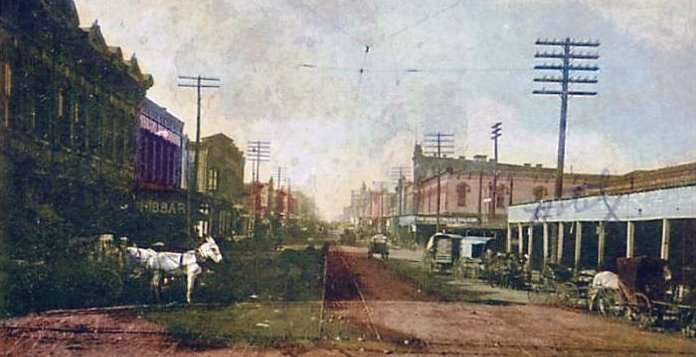
Main Street, Denison, Texas
Denison was founded after the Missouri, Kansas and Texas Railroad crossed the Red River from Indian Territory (now Oklahoma) in 1872. In 1873, the new town became the northernmost terminus for the Houston & Texas Central Railroad. A lively description of Denison during its early days can be found in King's and Champney's Texas: 1874 (Houston: Cordovan Press, 1974), pp. 136-154. When Arthur first saw it, only thirteen years after its founding, Denison was still a rough and tumble frontier town.
Arthur's story continues:
It was soon learned we were in the market for a farm and the real estate men gave us many fine trips in the country for miles around.
Mother, with the counsel of my two brothers-in-law, decided on a little farm about 2½ miles northwest of Denison as best suited to our needs. There were 80 acres in the tract, of which 30 acres were in cultivation. It was owned by an old man by the name of Rogers. He was disposing of his wife as well as his farm. In order to make it agreeable all around, he was giving her 20 acres out of the northeast corner of the tract-leaving 60 acres for sale.
The house was situated on the brow of a big hill which sloped rapidly to north, east, and west. At the foot of the hill a little spring creek wound its way, separating the field. In the sketch you can see the barn just under the hill to the right or east. The scene is looking north. The landscape sloped gradually to the front, with no trees, but to the back along the little stream there were a thick undergrowth mingled with trees of considerable size (which you can not see from the viewpoint of the sketch).
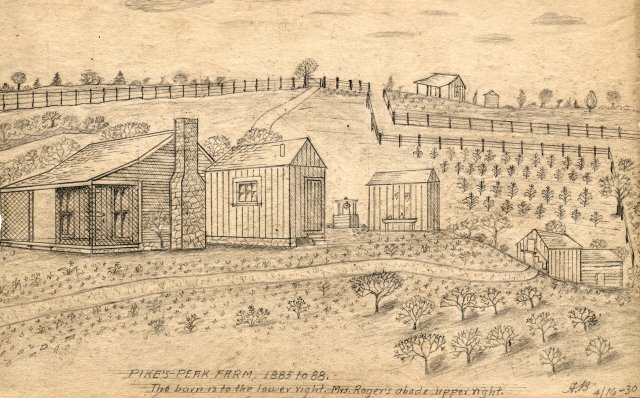
Arthur Babb's drawing of the Pike's Peak Farm
The little shack in the upper right is that which was allotted to Mrs. Rogers—with her 20 acres. It is where she took up her abode with a young son by a former husband. Her son's name was Jim Corinth. He was about sixteen years old and not very bright. As I heard a man one time express a similar case, "The Lord did not do very much for Jim." His mind gave way one day, about a year later, and I had an awful struggle with him right at the end of the little shack. The occurrence was in my mind as I was making the sketch. But I am getting off the subject.
There was no cultivation this side of the little stream, except the orchard and a little garden space. The rest of the hillside was a natural lawn down to the woods along the stream. In the winter, when it was covered with snow, I would make a sled and put my little brother and sister aboard and turn it loose at the top of the hill. The sled would start off with a wonderful momentum, but the valley was just right to check it without doing damage—though it would strike a rock and spill them off sometimes. This hill being so high and steep, my brother-in-law Charley Heason called it "Pike's Peak," and we always spoke of it by that name.
Now I will have to take a few steps backward. Yes, the place was decided upon and the papers drawn up. There were some oats in the shack that we had bought with the place, that I had to go out and put in the barn before returning to my home at Mexia, to dispose of my crop that I had left there. I equipped myself with a blanket, as I had to remain overnight. I stayed with the old man but preferred my own bedding. We worked all day and came in a little late. We had our snack rather than supper and afterward, he proceeded to interest me by telling many of his escapades in life (some of which I thought he should not be proud). Then I spread my pallet on the floor and laid down. Mr. Rogers put out the light but I did not go immediately to sleep. I was listening to the most wonderful "serenade" that I had ever heard. The whipperwhill was making his shrill calls regularly, the screetch-owl was shivering in his lonesome little notes now and then, and then the voice of the hoot-owl not so far away-and an answer a-w-a-y down in the woods. The cricket was chirping his merry accompaniment. Then for no reason at all came the discordant shriek of a night-hawk. This all kept up far into the night. But this was not the last time that I was to listen to this merriment of the night-birds. Many nights of the following two or three years they lulled me to sleep—and I learned to like them. I am sure that Thoreau on the banks of Walden pond never enjoyed his "night friends" more than I at the old "Pike's Peak" farm.
Deed records at the Grayson County courthouse at Sherman confirm the sale of this property (60 acres in exchange for $800) by Moses A. Rogers and his wife Sarah L. Rogers, to Lucy Ann Babb on August 3, 1885. The transfer of ownership was recorded two days later. READ THE DEED
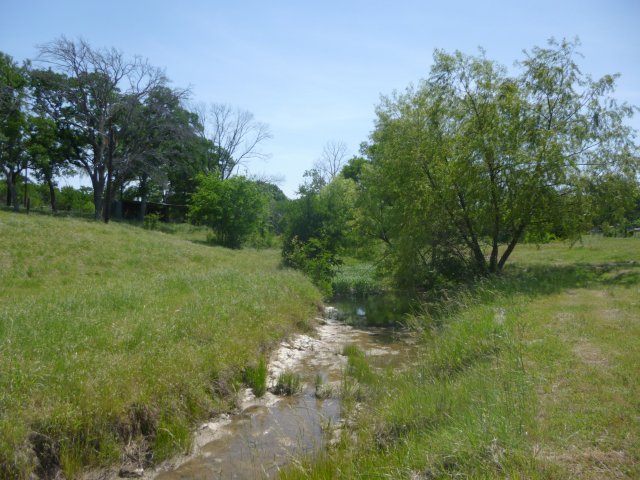
The little creek that Arthur wrote about still flows through the property that once belonged to his mother, Lucy Ann Babb.
Photo by the author taken in 2014.
Arthur's story continues:
At the end of three weeks, having accomplished our purpose, our visit came to an end. I was to go back and dispose of my crop as before stated, and Mother would take the three children, Sister Ione—older than myself (I would not so state this fact if I thought she would ever see it; for she was as touchy about her age as a sore-backed horse-and always wanted to make believe that she was younger than me instead of older), Sister Annie—ten years old, and Hugh—a little boy of eight. They were to go out and occupy the farm and await my return.
Read Part Three: A Wintertime Journey
|